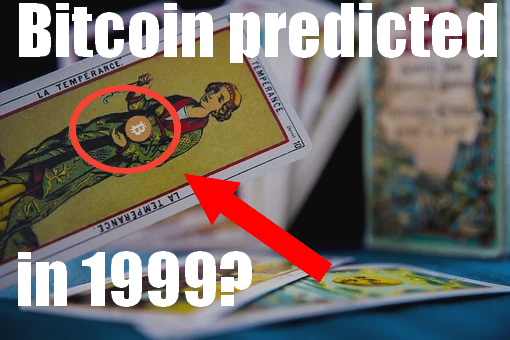You might have heard about people predicting a world-currency or that economists have “predicted Bitcoin even before Bitcoin existed”. Is this because they had special powers or were there cryptocurrencies before Bitcoin?
Milton Friedman 1999 – his Bitcoin prophecy
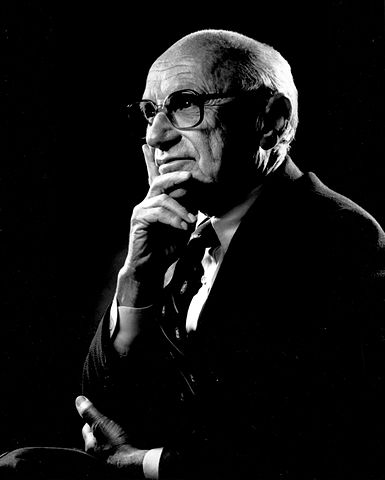
The well-known economist Milton Friedman 1999, said: “The one thing that’s missing, but that will soon be developed, is a reliable e-cash – a method whereby on the Internet you can transfer funds from A to B without A knowing B or B knowing A” (Interview 1999)
Another great example of a predictive super-power:
Neal Stephenson 1999 – cryptocurrencies Nostradamus
In the science-fiction novel “Cryptonomicon” from 1999, author Neal Stephenson predicted crypto currencies:
“No paper at all?”
“No paper at all.”
“So you can only spend it on the Net.”
“Correct.”
“What if you want to buy a sack of bananas?”
“Find a banana merchant on the Net.”
“Seems like paper money’d be just as good.”
“Paper money is traceable and perishable and has other drawbacks. Electronic banknotes are fast and anonymous.”
“What’s an electronic banknote look like, Randy?”
“Like any other digital thing: a bunch of bits.”
“Doesn’t that make it kind of easy to counterfeit?”
“Not if you have good crypto,” Randy says. “Which we do.”
“How did you get it?”
“By hanging out with maniacs.”
“What kind of maniacs?”
“Maniacs who think that having good crypto is of near-apocalyptic importance.”
[„Cryptonomicon“ SciFi novel from Neal Stephenson 1999]
How is this possible? Did they really had a crystal ball?
Theories about the one-world super currency meme are around since world war II. It was a proposal of Keynes who came up with a “more robust” world currency called “Bancor”. Since then people are predicting the arrival of such a system.
What is with the people exactly describing a system like Bitcoin? Where there currencies similar to Bitcoin?
The first digital currencies
As you might know: the development of cryptographic secured digital money started way earlier. How early?
The Big Bang of digital currencies
We could go back as far as electronic credit card systems are around. This would be the late 60s. When it comes to internet currencies, we find ourselves in the late 80s to early 1990s. One of digital-crypto cash´s pioneers was David Chaum.
- Anonymous Communication/the Mix-Network [Chaum 1981]
- “Security without Identification: Transaction Systems to Make Big Brother Obsolete” (David Chaum 1985)
- DigiCash – first anonymous e-cash [Chaum and Company 1990]
The first thing was the invention of anonymous communication. In the next step, the crypto-activist community shifted its focus to money, because money could also be seen as a form of communication. However, compared to the bulk of the digital currencies and e-cash schemes of the 90s, the crypto-activist projects were rather few. The main driver for development was the first internet euphoria in the early 90´s and the internet boom in the late 90´s to early 2000´s
The first internet currencies
There were probably hundreds of projects and payment-systems. Only a few of them survived and became centralized cryptographic currencies like PayPal. The following table is an extended version of the great work of Bitcoin and Cryptocurrency Technologies Online Course (2015):
| ACC | CyberGold | IMB-MP | NetCard | Sandia Lab EC |
| Agora | DigiGold | InterCoin | NetCash | SecureCourier |
| AIMP | Digigold | Ipin | NetCents | Semopo |
| Allopass | Digital Silk Road | Javien | NetCheque | SET |
| b-money | e-Comm | Karma | NetFare | SET2Go |
| BankNet | E-Gold | LotteryTickets | No3rd | SubScrip |
| Bitbit | Ecash | Lucre | One Click Charge | SWAPEROO |
| Bitgold | eCharge | MagicMoney | PayMe | Trivnet |
| Bitpass | eCoin | Mandate | PayNet | TUB |
| Beenz | Edd | MicroMint | PayPal | Twitpay |
| C-SET | eVend | Micromoney | PaySafeCard | VeriFone |
| CAFÉ | First | Microsofpoints | Paytree | VisaCash |
| CheckFree | Flooz | MilliCent | PayTrust | VarietyCash |
| ClickandBuy | Virtual | Mini-Pay | PayWord | Wallie |
| ClickShare | FSTC | Minitix | Peppercoin | Way2Pay |
| ComerceNet | Electronic Check | MobileMoney | PhoneTicks | WorldPay |
| CommercePOINT | Geldkarte | Mojo-Nation | Playspan | X-Pay |
| CommerceSTAGE | Globe Left | Mollie | Polling | |
| Cybank | Hashcash | Mondex | Proton | |
| CyberCash | HINDE | MPTP | QQ-Coin | |
| CyberCents | iBill | Net900 | Redi-Charge | |
| CyberCoin | iKP | NetBill | S/PAY | |
Originally, PayPal was intended as a P2P-E-Cash for handheld PCs (comparable with the smartphones of today). Big companies like Microsoft, IBM and established payment-service providers like Visa and Mastercard, tried to invent a standard called SET (Secure Electronic Transaction). Microsoft had the vision of implementing an internet currency into the Windows95 browser. Others were more libertarian type system like digi-gold and e-gold (don’t confuse with Szabos Bit-Gold) or Liberty Reserve.
The problem was that those systems were not allowed by the regulators (because of violation of anti-money laundering). This is why companies had to shut down. Most of the founders were sued and left the US.
The Role of NSA in Bitcoin -their activities before Bitcoin
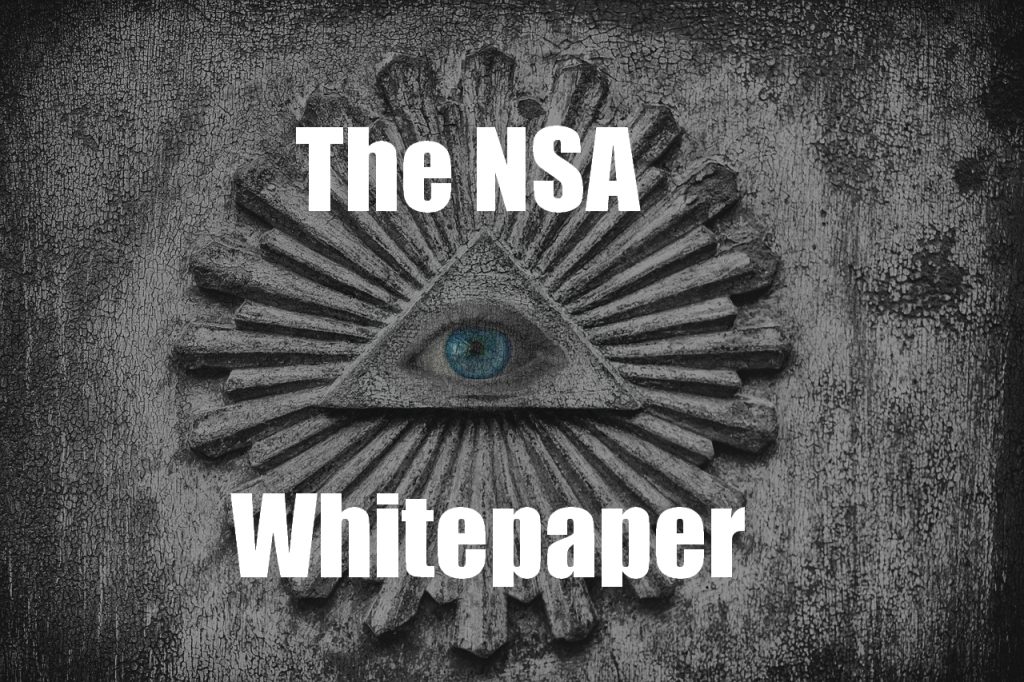
The government tried to figure decentralized currencies out. The NSA had research-papers like
“HOW TO MAKE A MINT: THE CRYPTOGRAPHY OF ANONYMOUS ELECTRONIC CASH” (NSA 1996)
This paper was more a state of the art comprehension of what was possible at that time. Many important decentralized- and cryptographic technologies were invented by government organisations like the NSA and the DARPA:
- the internet protocol
- TOR or more correctly onion routing
- The SHA-2 algorithm family
Something like Bitcoin would be the next logical step. Even Vitalik Buterin 2011 was aware of the possibility that Bitcoin is a NSA invention. However, there is really no strong evidence to support this hypothesis. Today, Buterin has changed his view. If Bitcoin really was invented by the NSA, this does not mean that the NSA controls the system. Now you might ask: “why do they publish anarchistic technologies like this at all?”…Imagine you are the NSA, and the technology you fear would be invented anyways, and this technology is needed in suppressed countries (remember you are the government promoting your system)… wouldn’t it be better, that the world is using your standard? Cost = some criminal can use it AND Benefit = you can destabilize dictatorships and take over those systems. This is just my hypothesis.
The Cypherpunk movement – did they invented Bitcoin?
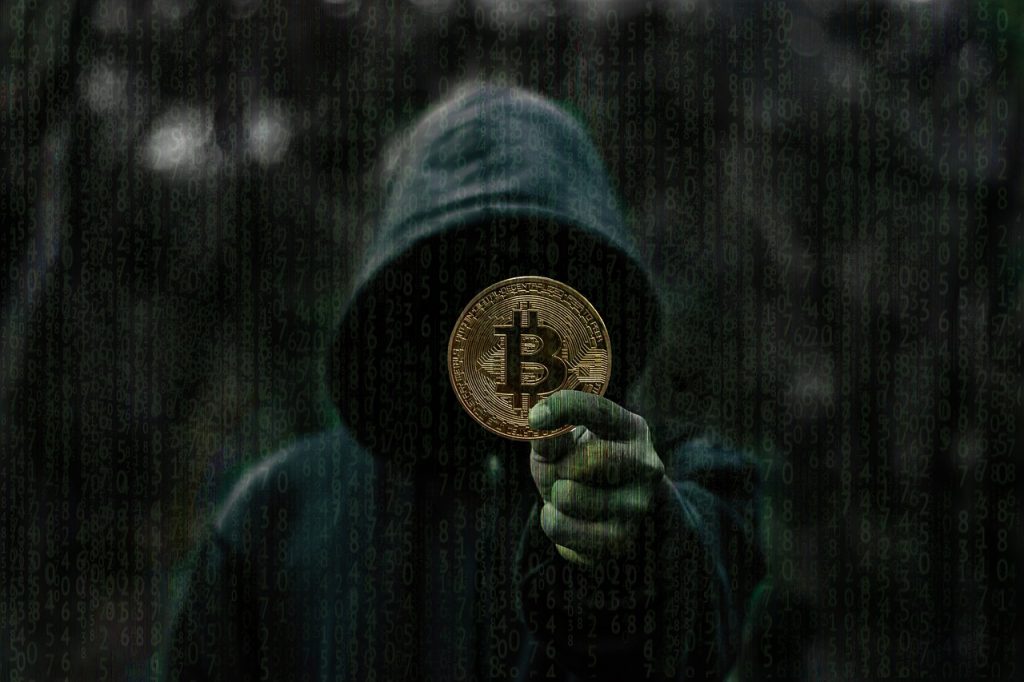
In 1993 a small group of internet activists called “Cypherpunks” started to shift their focus from anonymous communication to anonymous transactions. Eric Hughes a well known member, wrote down their goals in the Cypherpunk manifesto. The manifest was distributed via the Cypherpunk mailing-list. One of those mailing-lists where the Bitcoin whitepaper originally was published.
“…Therefore, privacy in an open society requires anonymous transaction systems. Until now, cash has been the primary such system. An anonymous transaction system is not a secret transaction system. An anonymous system empowers individuals to reveal their identity when desired and only when desired; this is the essence of privacy.” –
(Eric Hughes 1993)
Is this Bitcoins evolution? Decentralized cryptocurrencies developed before Bitcoin:
A few schemes similar or related to Bitcoin originated in the Cypherpunk scene :
- The Mix-Network [Chaum 1981]
- “Security without Identification: Transaction Systems to Make Big Brother Obsolete” (David Chaum 1985)
- DigiCash – first anonymous digital money [Chaum and Company 1990]
- Proof-of-Work [Cynthia Dwork und Moni Naor 1992]
- Smart Contracts [Nick Szabo 1993]
- PGP [Zimmermann 1995] Data encryption for public communication
- B-money [Wei Dai 1998] Concept
- BitTorrent [Bram Cohen 2003]
- Hashcash [Back 2002]
- RPOW [Hal Finney 2004] Re-usable Proof-of-Work. Running software
- Bit Gold [Nick Szabo 2005 (1998 Idee)] Concept
If this is really how it went, is questionable. In the first public version of the Bitcoin Whitepaper, there were no Cypherpunk technologies cited and no hints that Nakamoto was inspired by the Cypherpunk scene. Later, on the suggestion of Adam Back, did Nakomoto added these references. However, there were very similar systems to Bitcoin even before Bitcoin was invented. B-Money, RPOW and Bit Gold.
Mass adoption in China in 2003
In China as early as 2003, the QQ-Coin for the Chinese social media giant Tencent saw mass adoption. People used the QQ-Coin that heavy, that it was Chinas dominating currency for internet payments. At one point, the government regulated the currency because they saw a big risk in destabilization of the official national currency. Today China is dominated by mobile payments like Q-Pay, Ali-Pay, Vechat-Pay.
Africa has adopted P2P-E cash before Bitcoin was invented
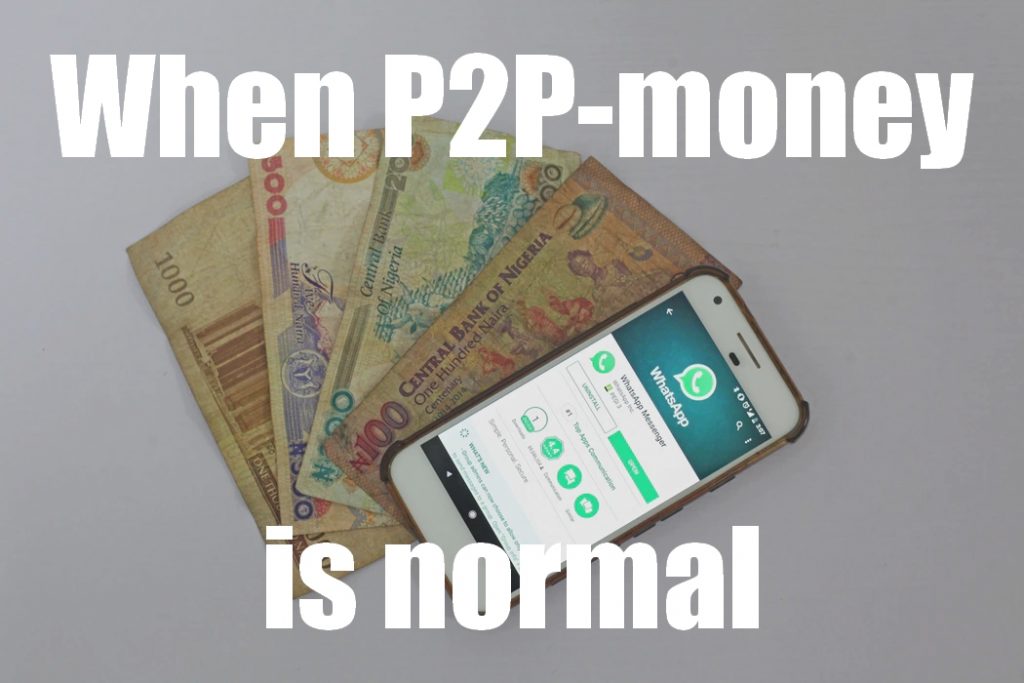
In the so called “third and second world”, people rely on mobile payments. Many of those systems are P2P-payments. The reason for this is not anonymity. The people in South-America, Africa, Asia simply often have no access to banks. This is why they figured out other forms of money. People noticed that airtime for mobile phones is a good form of money. Telecom-Companies like Vodafone used the opportunity and established their SMS-based P2P-Payment services. One of the biggest (in terms of adoption) is M-Pesa. M-Pesa is provided by Vodafone. However, many of the systems are locally adopted Systems like ZAAD.
ZAAD is used in the autonomous Republic Somaliland. Imagine you buy a camel. In Somaliland auctions and deals are made only by handshake. When you find an offer in which you are interested in, you go to the dealer, you shake hands and by the movement of the fingers a price will be communicated. When both parties agree the release the handshake, everyone pulls his smartphone out and a code is exchanged. You wait for some seconds…and payment done. Now you are the proud owner of a new camel.
What was the first cryptocurrency?
Despise the development in payment-systems, there also was a different development much closer to Bitcoin and it not directly related to payment system. With the adoption of P2P-file-sharing systems, there came a substantial problem:
Leachers! A leacher is a person using the service, downloading files without contributing. Obviously a system were people only consume network-resources like bandwidth, without contributing will not work.
The decentralized mint
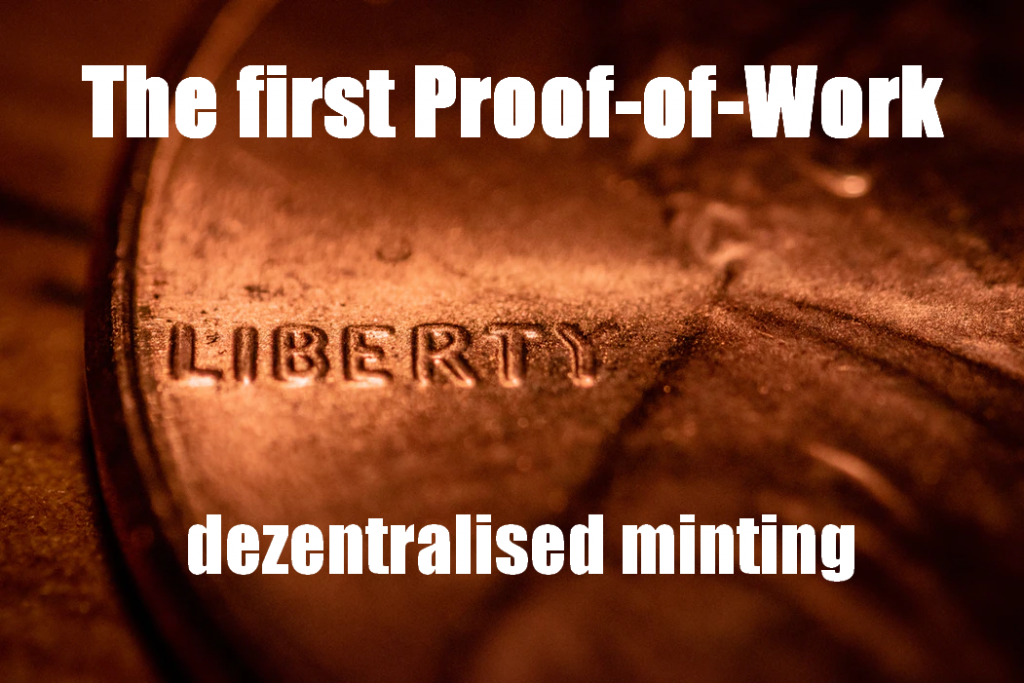
To prevent leaching, the developers introduced a token-system. For downloading, you have to pay and by uploading you get rewarded or you regain your balance. Systems like BitTorrent and Napster were decentralized systems, so there was one obvious problem:
Who is issuing the tokens? The answer was >>proof-of-work based token-minting<<.
Systems like Karma and Mojo Nation were the first systems using Proof-of-Work schemes. Then first micro payment services like Micromint joined.
Which was the first cryptocurrency?
This means that it depends on what you mean by crypto currency. If you mean any digital currency which uses strong cryptography to secure its accounts, or to provide anonymity then you also refer to bank-cryptocurrencies and things like DigiCash but when you mean a decentralized system, which is based on a cryptographic puzzle, then Karma, Mojo and Micromint are the first cryptocurrencies.
So, have people foreseen cryptocurrencies and Bitcoin?
Hopefully you have learned, that this was no act of foresight, it was just the spirit of this time. There were many systems aiming to be the currency of the internet and this way before Nakamoto invented Bitcoin. Despite all those developments, people still think Nakamoto came from a different direction. People think that Nakamoto is or was a Cypherpunk, a libertarian, a crypto-anarchist. The Cypherpunk community was rather small. They were people with different ideological backgrounds. Some libertarian, some anarchists, others simply concerned about privacy.
If you want to learn if Nakamoto was really libertarian and anti bank, you should read this article!
I´m learning about the space since end of 2016 and I bet there are still details I don´t know or get. If you know important parts of the puzzle to why it took so long for crypto to take off, let me know.


